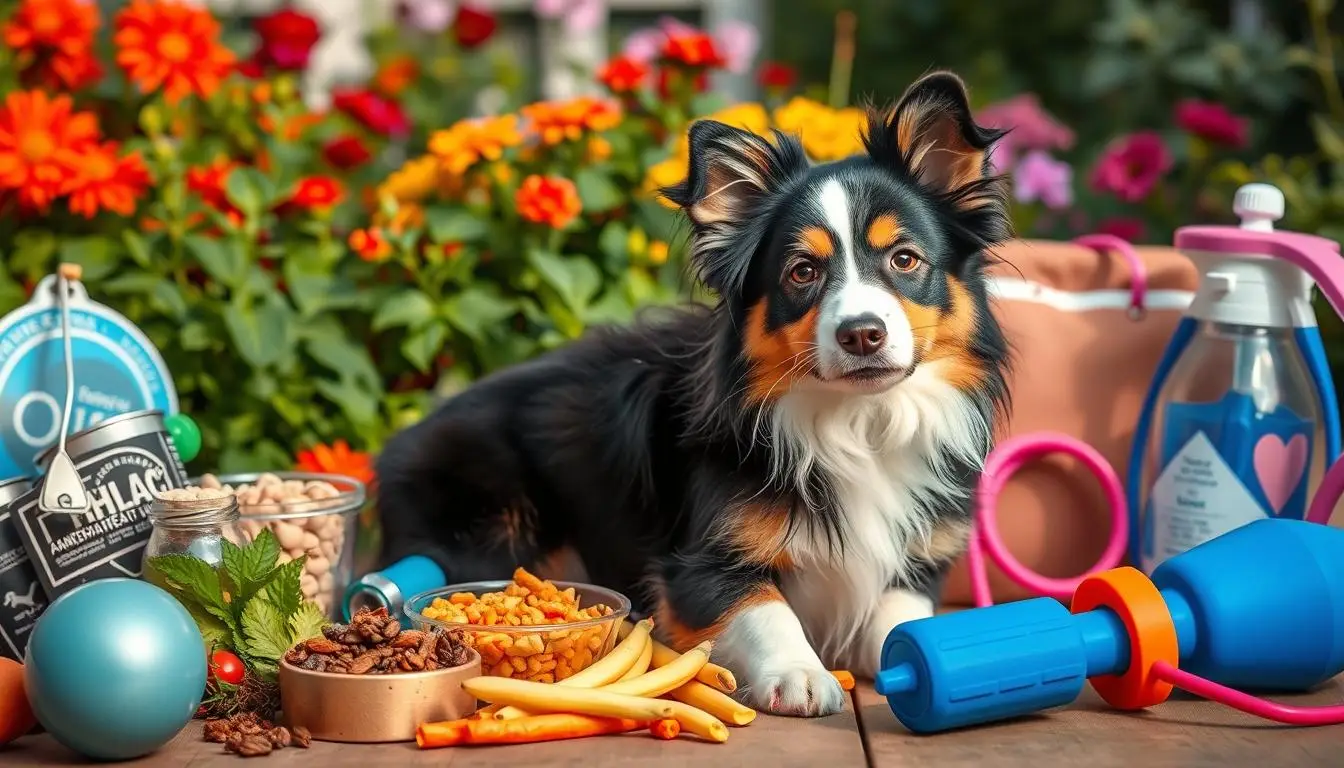Did you know over 40% of small dog breeds face common health issues because of their size? As a proud owner of a small pup, knowing the health risks they have is key to their health. It’s important to take steps to prevent common problems.
Small dog breeds, like teacup varieties, win hearts with their cute looks and fun personalities. But, their small size brings health challenges that need extra care from owners.
By knowing the genetic and environmental factors that affect your small dog, you can reduce health risks. This way, your furry friend can live a happy, healthy life with you.
Key Takeaways:
- Small dog breeds face unique health risks due to their miniature size
- Genetic predispositions and environmental factors play a role in small dog health
- Owners must be proactive in preventing common health issues in their pint-sized pups
- Understanding your small dog’s specific needs is key to maintaining their well-being
- Regular check-ups, proper nutrition, and exercise are essential for preventing health problems
Understanding the Unique Health Risks of Small Dog Breeds
Small dog breeds face special health challenges. Their size and cuteness are irresistible, but they are more likely to get certain health problems. Knowing the genetic and environmental factors that affect their health helps keep them well.
Genetic Predispositions in Miniature Breeds
Chihuahuas, Pomeranians, and Toy Poodles are at risk for certain health issues. These include dental problems, breathing issues, joint problems, and metabolic disorders. Being aware of these risks helps you work with your vet to keep your dog healthy.
- Dental issues due to overcrowded teeth
- Respiratory problems, such as tracheal collapse
- Orthopedic conditions, like patellar luxation
- Metabolic disorders, such as hypoglycemia
Regular vet visits, preventive care, and early treatment can help manage these risks. This way, you can ensure your small dog stays healthy and happy.
Environmental Factors Affecting Small Dog Health
Environmental factors also play a big role in small dog health. Important factors include diet, exercise, dental care, and home safety. These factors can greatly impact their well-being.
| Factor | Impact on Small Dog Health |
|---|---|
| Diet | Small dogs need nutrient-rich, controlled meals to stay healthy and avoid obesity. |
| Exercise | Exercise keeps small dogs fit and healthy. But, it’s important to match activities to their size and energy. |
| Dental Care | Small dogs are at risk for dental disease. Regular dental care is key to preventing serious dental problems. |
| Home Safety | Small dogs are more likely to get hurt in the home. Creating a safe environment is vital to prevent accidents. |
By understanding the health risks of small dogs and taking action, you can ensure your pet lives a long, happy life. Remember, prevention is the best way to keep your small dog healthy!
Common Health Issues in Small Dog Breeds and How to Prevent Them
As a proud owner of a small breed dog, it’s important to know about their health challenges. Respiratory issues and joint problems are common in these dogs. Understanding these conditions and how to prevent them can help your dog live a better life.

Respiratory Issues in Small Dogs: Causes and Symptoms to Watch For
Small dogs face more respiratory problems than big dogs because of their size. Breeds like Pugs, French Bulldogs, and Shih Tzus often have trouble breathing. Look out for symptoms like snoring, coughing, and wheezing.
- Snoring or noisy breathing
- Coughing or wheezing
- Exercise intolerance
- Bluish gums or tongue
To reduce respiratory risks, keep your dog at a healthy weight. Regular exercise and a balanced diet are essential. Also, avoid extreme temperatures, as they can be hard for small dogs to handle.
Identifying and Managing Joint Problems in Small Dogs
Small dogs can also have joint issues like arthritis and luxating patellas. These problems can cause pain and make it hard for them to move. Look for signs like limping, stiffness, and reluctance to jump.
- Limping or favoring a leg
- Reluctance to jump or climb stairs
- Stiffness or slowness when getting up
- Yelping or whining in pain
To prevent joint problems, keep your dog at a healthy weight. A balanced diet with omega-3 fatty acids and glucosamine is also helpful. Regular, low-impact exercise keeps joints flexible and muscles strong.
Remember, early detection and intervention are key to managing your small dog’s health. Regular vet visits can catch issues early, keeping your dog happy and healthy for years.
Dental Disease: A Prevalent Problem in Pint-Sized Pups
Even though they are small, pint-sized pups can get dental disease. Small dogs often face oral health problems because of their face shape and genes. It’s important for pet owners to know how to prevent dental issues in their pets.
Causes and Symptoms of Dental Issues
Several things can lead to dental disease in small dogs. These include:
- Teeth crowding in their small mouths
- Diets high in carbs that cause plaque
- Genetic tendencies to get periodontal disease
Look out for these signs of dental problems:
- Bad breath (halitosis)
- Yellow or brown tartar on teeth
- Red, swollen, or bleeding gums
- Difficulty eating or chewing
Preventive Measures for Optimal Oral Health
There are ways to keep your small dog’s teeth healthy. Here are some steps:
- Brush your dog’s teeth daily with a soft toothbrush and pet-safe toothpaste
- Give dental chews and toys to help clean teeth
- Feed a good diet that doesn’t cause plaque
- Take your dog for regular dental check-ups
An ounce of prevention is worth a pound of cure when it comes to your small dog’s dental health.
Professional Dental Care for Your Furry Friend
Even with good home care, your dog needs vet dental cleanings. These cleanings help keep their teeth healthy. Your vet will:
- Remove tartar and plaque above and below the gumline
- Polish teeth to prevent future plaque
- Check for any dental problems
By focusing on your dog’s dental health, you can prevent dental disease. This ensures they have a healthy smile and happy life.
Nutrition and Exercise: Key Components of a Healthy Lifestyle
As a small dog owner, you’re key to keeping your pet healthy and happy. Proper nutrition and regular exercise are essential. Tailoring your dog’s diet and adding daily activity can prevent health issues and keep them well.
Tailoring Your Dog’s Diet to Their Specific Needs
Every small dog is different when it comes to food. Choose a high-quality dog food that meets their needs. Consider their age, activity level, and health conditions. Talk to your vet to find the best diet for your dog.
Here’s a quick guide to help you choose the right food for your small breed:
| Age | Recommended Food Type |
|---|---|
| Puppy | Puppy-specific formula with higher protein and calories |
| Adult | Balanced adult formula with appropriate nutrient ratios |
| Senior | Senior-specific formula with reduced calories and added joint support |
Incorporating Regular Exercise into Your Dog’s Routine
Even small dogs need regular exercise to stay healthy. Aim for 30 minutes of moderate exercise daily. You can break this into shorter sessions if needed. Fun activities include:
- Daily walks around the neighborhood
- Playing fetch with a small toy
- Indoor games like hide-and-seek
- Agility courses designed for small breeds

Maintaining a Healthy Weight for Your Small Breed
Keeping your small dog at a healthy weight is vital. It prevents health issues like joint problems and breathing difficulties. Check your dog’s body condition regularly and adjust their diet and exercise as needed. A good rule is to feel their ribs without pressing too hard, and see a visible waist when viewed from above.
“A healthy lifestyle is the key to a happy and long life for your small dog. By providing them with proper nutrition and regular exercise, you can help them avoid common health issues and enjoy their golden years by your side.”
Every dog is unique, so work closely with your vet to create a personalized plan. With effort and dedication, you can keep your furry friend healthy and happy for years.
FAQ
Q: What are some common health problems in small breed dogs?
A: Small breed dogs are not just adorable, they come with their own set of unique health problems. Common health conditions include tracheal collapse, patellar luxation, obesity, and brachycephalic airway syndrome. Always keep an eye on your furry friend for any symptoms that may arise!
Q: How can I tell if my dog is experiencing tracheal collapse?
A: Symptoms include a honking cough, difficulty breathing, and sometimes a gagging sound, especially when excited or during a walk. If you notice these symptoms, it might be time to take your pup to the vet for a check-up!
Q: Is patellar luxation common in small dog breeds?
A: Absolutely! Patellar luxation is a fancy term for a dislocated kneecap, and it’s a common issue in toy breeds. If your dog exhibits lameness or seems to skip while walking, it might be time for a visit to the veterinarian.
Q: How can I prevent my small dog from becoming obese?
A: Keeping your small dog at a healthy weight is crucial! Ensure a balanced diet, portion control, and daily exercise. If your dog is overweight, consider working on a weight loss plan tailored by your vet!
Q: What is brachycephalic airway syndrome and which dogs are affected?
A: Brachycephalic airway syndrome affects flat-faced breeds like Bulldogs and Pugs. They can struggle with breathing due to their unique facial structure, which can lead to serious complications. If your dog is having difficulty breathing, please consult your veterinarian.
Q: What are the symptoms of pancreatitis in dogs?
A: Symptoms of pancreatitis can include vomiting, abdominal pain, and weight loss. If your small dog seems to be losing weight or is reluctant to eat, it’s important to consult your vet as pancreatitis can be a severe condition!
Q: How often should I take my small dog to the veterinarian?
A: Regular check-ups are vital! Aim for at least once a year, but if your dog has existing health problems or is showing any unusual symptoms, don’t hesitate to book an appointment sooner. Better safe than sorry!
Q: Can pet insurance help with the health problems common in small dogs?
A: Yes! Pet insurance can be a lifesaver when it comes to covering unexpected veterinary bills for those common small dog health problems. Check what plans are available and find one that suits your furry friend’s needs!
Q: What is IVDD and how does it affect small breed dogs?
A: IVDD, or intervertebral disc disease, can cause spinal problems in small dogs, especially dachshunds. Symptoms may include difficulty walking or signs of pain. If you notice any of these, it’s important to consult your veterinarian right away!
Q: Are there specific health conditions that are unique to small dog breeds?
A: Yes, small dogs tend to have some health problems that are unique to them, such as dental issues, tracheal collapse, and patellar luxation. Regular dental care and check-ups can help mitigate some of these conditions!
Conclusion
As a proud owner of a small dog breed, it’s key to know the health challenges they face. These include respiratory issues, joint problems, and dental disease. To keep them happy and healthy, they need special care.
Understanding the genetic and environmental factors behind these issues helps a lot. You can then take steps to prevent or manage them. Regular vet visits, a balanced diet, and exercise are vital for their health.
Don’t overlook dental care! Brushing their teeth and giving them dental chews can prevent dental problems. For more on common health problems in small breeds, talk to your vet.
As a small dog owner, you’re key to their health and happiness. Stay informed, proactive, and dedicated to their care. With love and attention, you and your small dog can enjoy many happy years together.








